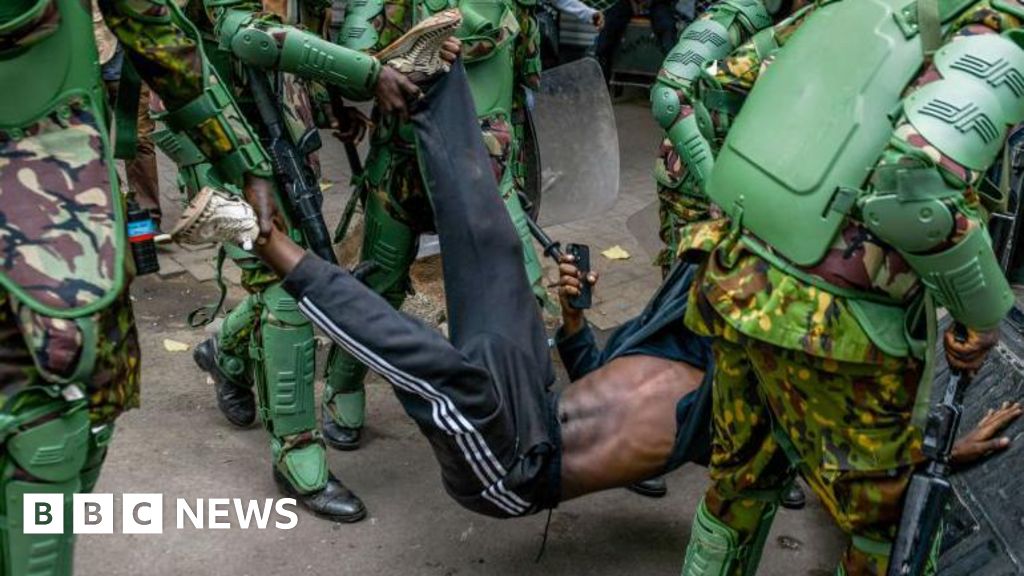Kenyan anti-tax protesters kidnapped during a crackdown last week are traumatized, lawyers say.
An estimated 35 people suspected of leading demonstrations against the finance bill, which has been withdrawn, have been arrested in an operation allegedly orchestrated by intelligence police units.
Most of the abductees have been released, but the Kenya Bar Association told the BBC that 10 activists were still missing.
Government spokesman Isaac Mwala defended the police action and said “criminal elements who want to stage a coup” were trying to take advantage of the peaceful protests.
Some described how their phones and laptops were confiscated and horrific experiences they endured in darkened rooms.
“Most of them were visibly shaken and didn’t want to talk,” Law Society of Kenya (LSK) president Faith Odhiambo told the BBC.
The youth-led protests began last week, with thousands of demonstrators marching peacefully in the capital Nairobi and across the country against a controversial finance bill that would increase taxes.
But tensions escalated sharply on Tuesday afternoon when police opened fire on protesters outside parliament and the crowd broke into the chamber.
At least 23 protesters were killed in Tuesday’s violence, according to the doctors’ association
The next day, President William Ruto bowed to pressure and said he would withdraw the bill passed by lawmakers on Tuesday.
He also reiterated his election pledge to end state-incited kidnapping as a political tool amid the wave of disappearances.
His deputy, Rigathi Gachagua, blamed the kidnapping on the police’s National Intelligence Service (NIS).
On Wednesday, Mr Ruto said all abducted people had been released, but rights groups disputed this and Ms Otiambo said 12 people were still missing as the president spoke.
“But two people have [since] Found. One of them was found naked in a tea garden yesterday,” she said.
The LSK president said many of those released were not physically injured but were so traumatized that they did not want to talk about their experiences.
“Some were left in plantations outside Nairobi, while others were dumped on the roadside in shock.”
She added that some said they now just wanted to return to the village because they felt unsafe in the city, and some talked about leaving the country entirely.
Most of them are under 30 years old and were snatched from the streets or homes by plainclothes gunmen believed to be police.
Most people have been vocal about anti-tax protests on X Spaces, a feature that allows users to engage in instant audio conversations with others on the platform formerly known as Twitter.
They said the kidnappers asked about their contribution to the protests and who was funding them.
“Some of them were asked who gave them the idea to protest,” Ms Odiambo said.
George Deano was one of the first abductees In X’s post Detailed some of the trauma he suffered and asked people to pray for those who are still missing.
“It’s never easy in the hands of these damn animals. A lot of them can’t talk, but they do get you dirty,” Mr. Deano said.
Austin Omondi, a doctor popularly known as Ja Prado on social media who had been organizing blood donations for people injured during the protests, was also abducted.
He was held for six hours and later released after doctors threatened to strike. told BBC Newsday.
“He has not spoken since he was detained because his life was threatened if he revealed what happened when he was abducted,” Mr Atla said.
Kenya’s state-funded National Human Rights Commission said it had helped secure the release of more than 300 people “unlawfully detained”. This is thought to refer to people arrested during demonstrations.
Chief Justice Martha Coombe condemned the kidnapping, saying it amounted to a direct attack on the rule of law.
earlier, High Court approves use of force Given that police are overwhelmed to restore order during protests.
A judge said the military deployment was vital to protecting government installations but gave authorities two days to clarify how long it would last and its rules of engagement.
Mr Mwala told the BBC that withdrawing the finance bill was a “huge blow to the government because it leaves a “big hole” in the budget.
“This is indeed a big setback,” said Mr Mwala, who blamed Kenyans for opposing the plan and “misinformation”.
“There is a well-orchestrated campaign, both locally and internationally, to mislead and mislead people so that they can launch an insurrection.”

